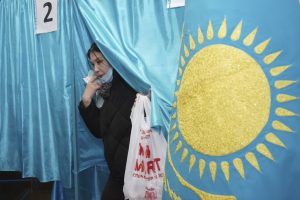On the fourth anniversary of Nursultan Nazarbayev’s 2019 resignation from Kazakhstan’s presidency, Kazakhstanis went to the polls to vote in a parliamentary election unlike any in recent memory. While the election featured two newly registered political parties and hundreds of independent self-nominated candidates vying for seats in the newly reconfigured parliament, the election’s low turnout suggests a lack of enthusiasm.
According to preliminary data, nationwide turnout reached 54.19 percent. Turnout varied massively by region, with Kyzylorda topping the numbers with a turnout of 67.21 percent and Almaty city, Kazakhstan’s largest city, scraping the bottom with a turnout of 25.82 percent.
A constitutional referendum last summer, in addition to ditching constitutional references to “Elbasy,” reformatted Kazakhstan’s legislature. The Mazhilis, the lower house of the parliament, was reduced to 98 deputies, with 29 seats being directly elected in single-mandate constituencies. The reintroduction of independent candidates for these 29 seats led to a ballooning number of hopefuls: 435 candidates, most of them self-nominated, contested the election. This led to an absurd number of candidates for some posts; for example the capital, Astana, saw 41 candidates for a single seat, and 42 for another. This, and the legally mandated one-month campaign, made it virtually impossible for neophyte candidates to reach voters, explain their platforms, and win votes.
Preliminary results regarding the party-list votes were released first. According to Kazimform, Kazakhstan’s ruling party, Amanat (formerly known as Nur Otan), captured 53.9 percent of the votes cast, followed by Auyl with 10.9 percent. 8.59 percent went to the newly registered Respublika Party, 6.8 percent to the People’s Party of Kazakhstan (PPK), 8.41 percent to Ak Zhol, and 5.2 percent went to the National Social and Democratic Party (OSDP) which had boycotted the previous parliamentary election in 2021. Exit poll data released earlier showed a similar breakdown, with OSDP teetering on the edge of the 5 percent threshold and the newly registered Baytak Party failing to gain entry,
Amanat’s figure is a notable climbdown from the 71 percent it captured in the 2021 poll, but all of the currently registered parties — include the two new parties — are viewed by analysts as pro-government. It’s worth noting that political parties in Kazakhstan, aside from Amanat, are not positioned as big-tent parties but rather representatives of more specific constituencies. Auyl, for example, which means “village,” is positioned as a party focused on rural and agricultural affairs. The new Respublika Party has been positioned as a entrepreneur’s party and one formed, in the words of its founder Beitbit Alibekov, to support President Kassym-Jomart Tokayev’s reforms and “so that rabid populists do not come to power.” Ak Zhol is also understood as a business-focused party, and the PPK is the modern iteration of the old Communist People’s Party of Kazakhstan. Importantly, none of the parties has gone out on a limb to challenge the status quo and they are not expected to.
If there was any novelty in Kazakhstan’s recent election, it was the participation of hundreds of self-nominated independent candidates. But party-nominated candidates also contested the single-mandate constituencies and won, demonstrating the value of a party apparatus.
The results for the single-mandate constituencies will come as a major disappointment to those hoping the 29 seats could be the genesis of a real opposition force in the Kazakh parliament. According to Vlast.kz, reporting the preliminary results, Amanat-nominated candidates were named winners in 23 of the 29 single-mandate constituencies. That means just six self-nominated independent candidates will make it into the parliament.
In its preliminary findings, the Organization for Security and Cooperation in Europe (OSCE)’s elections monitoring mission concluded that although there was “increased choice for voters,” further changes are needed “to provide a sufficient basis for conducting democratic elections.” Specifically, the OSCE was concerned by mechanisms that bar certain individuals and groups from participating in elections and administrative hurdles that “negatively affected the equality of campaign opportunities for some self-nominated candidates.”
Seat allotments have not been announced officially, but some back of the envelope math demonstrates that Amanat will come out with a strong majority, despite posting numbers far below previous elections. Amanat will have 23 single-mandate seats, plus 53.9 percent of the remaining 69 party-list seats (about 37), suggesting it will come away with a total of 60 out of 98 seats in the Mazhilis. For reference, Amanat held 78 of 98 elected seats in the previous parliament.
The 2023 election may mark a trimming of the ruling party’s majority, but not necessarily a significant one. As with all elections, what truly matters is what happens after the vote is tabulated: Will the six independent candidates be able to make an impact? Will Kazakhstan’s various parties continue to work in concert, or will any of them challenge the government’s trajectory?
Tokayev’s talk of a “New Kazakhstan” fronted a dynamic role for the legislature in the future of Kazakhstan. But the results of the election — in terms of who won and how few voted — suggest that much more needs to be done to convince the Kazakh people that they have a voice and the government is willing to listen to it.

































